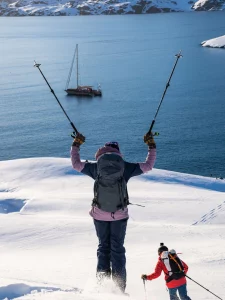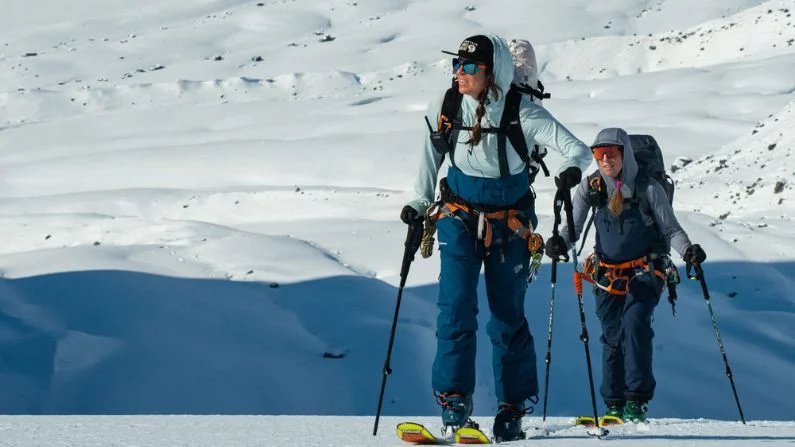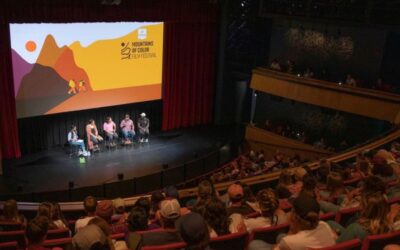What happens when you go on an arctic ski adventure in Greenland and travel in a boat that runs only on renewable energy? Professional skiers Rachael Burks and Jessica Baker, a Jackson local, put this idea to the test in their new film, “Going Greenland.” The film premieres at the Center for the Arts in Jackson this Thursday at 7 p.m.
Baker and Burks met while competing in freeskiing competitions around the world. Burks is based out of Utah and is known for skiing burly lines off some of the world’s steepest peaks. Baker has lived in Jackson for over 20 years and works as a mountain guide while also putting on ski camps for women.
They both joined us at the KHOL studio to discuss the film ahead of its premiere.
This conversation has been edited for clarity and brevity. It was recorded on Tuesday, Jan. 3.
Hanna Merzbach/KHOL: Would you tell me more about how this film came to be?
Jessica Baker: Rachael and I had this pretty epic adventure in Greenland in 2019 on the same sailboat. We still had a diesel motor, but there were these whisperings of wanting to transform the boat into a renewable energy boat. The captain, Benjamin Ruffieux, really wanted to pull it off. 2019 also just so happened to be one of the hottest years on record. In fact, we watched unprecedented melting while we were out there skiing on these massive glaciers and the ice cap. Also, a lot of climate change awareness was coming about during that time. Okay, now comes the pandemic. We have a couple of years where we can’t do anything. We’re all staying put, which in a way staying put is a pretty sustainable thing to do. In the meantime, our captain decides to go ahead and transform his boat into a renewable energy boat. He tore out the diesel engine and got back to me and he said, “All right, this boat is up and running in this new form.” Borders started to open, and we saw the opportunity for 2022 to be the next adventure to Greenland on a renewable energy boat.

The 2022 trip to Greenland was just the latest adventure in the Arctic for Burks and Baker. (Sophie Danison)
KHOL: It seems like ski films are going in this direction where it’s not just all about the big line. They also include other components, whether that’s environmental or related to equity and inclusion. Tell me a little bit about how you were kind of trying to strike that balance between making a ski film, but also diving into larger issues.
Baker: The interesting thing is this is not contrived. We literally witnessed alarming rates of melting in 2019. So, when we realized we were going to have this opportunity to go in 2022 on a renewable energy boat, it was a no-brainer because, not only would we be able to potentially witness what has happened over the course of three quite warm years, we would also be able to travel in a way that was more ecologically conscientious. While skiing was certainly a big part of what we were doing, the story was there. The adventure was there. That experiment was waiting for us.
KHOL: Tell me more about how you two met. What is your history together?
Rachael Burks: Jess and I met, I think, in 2003, and we were competing on the freeskiing world tour. I tell everyone that if Jess showed up, everyone else was fighting for second place. She was just like the awesome girl that won everything, but the beauty of that is we got to travel all over for those competitions and get to know each other a little bit. Then, fast forward a few years, and she and I both chose to pursue skiing as a profession. We took slightly different paths, but then they ended up coming back to each other about eight years ago, and we started collaborating on some amazing backcountry ski adventures. So, Jess has always just been a step ahead. There aren’t many people that are as interested and passionate about exploring the Arctic as Jess. We’ve known each other for a really long time. We get along pretty well too, which is weird after all these years in tight spaces.
KHOL: Just watching the trailer, it looked like there could have been some really challenging times. What do you think of when you look back?
Baker: When we work with a renewable energy boat, you have to start making compromises that you may not have foreseen. So, as a mountain guide and someone that has to make a lot of time plans and route plans and judge avalanche hazards, you throw in this boat that may or may not get you where you want to be going, and it definitely makes it more challenging. Decision making gets a lot harder and compromise just has to be a big piece of the puzzle.
Burks: I like to tell people that this was a real true adventure. There wasn’t a lot of certainty. It just felt like we were really isolated. And definitely our decisions mattered, you know? And it was harsh. It’s the Arctic. It was more like type two fun. It was truly wild, and some of that’s just the boat part. And then you get on these huge glaciers. A lot of them haven’t been explored, and that in and of itself has a little bit of an uncertainty and a danger to it. So it really was a real, raw adventure.
KHOL: What made all of those more challenging times worth it in the end?
Baker: I think really the worth is in both the challenges and the victories, the moments that felt dark and heavy and hard, and then juxtaposed with these high moments up on these peaks, standing on top and looking around and seeing the ocean and the ice cap. Your friends are right there with you and you’re about to ski these massive lines. And it’s taken a lot of work. It’s more than just payoff. It’s like this sense of awe and deep, deep satisfaction. It’s not just the ups or downs that are defining, it’s the whole thing that comes together.
KHOL: Your film is really asking, is it possible to follow your dreams and travel across the world and ski these crazy lines, while also trying to live more in harmony with the environment? Where did you land on that question?
Baker: The answer is not simple, and I think a lot of us are realizing this. It’s just not simple to try and live with less impact in your lives. So, to choose otherwise takes a lot of conscious effort. We were not by any means perfect in this effort. We took airplane flights to get over, and we’re using hotels on either end that are most likely fueled by fossil fuels. So, there’s no way that we even attempted to try to go fully green for the entire trip, but I do think taking some steps to make your recreation more sustainable is totally possible. We were able to travel on a renewable energy boat, and we still nailed all these amazing lines despite all the compromise that had to happen. It does show that it’s possible, but you have to know it may not be perfect. If you’re looking for perfection, I don’t think it exists. We are by no means preaching to people that they have to change their lives, but I do think we all recognize that we need to start taking action. We all have choices, and we can certainly make choices that make less of an impact on the environment.





